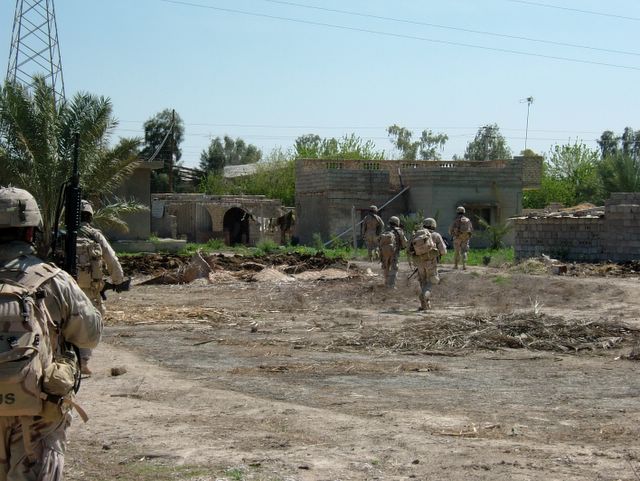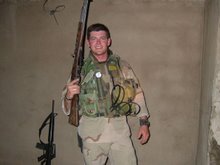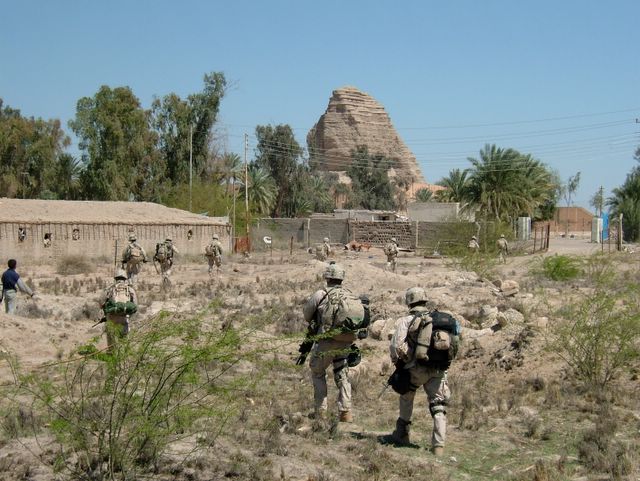Military claims gains on Iraqi terrorists
By KIM GAMEL, Associated Press Writer
BAGHDAD, Iraq - The U.S. military claimed an advantage in the fight against al-Qaida in Iraq on Thursday, saying raids since the death of its leader have forced many of its foreign fighters out into the open to be captured or killed.
Iraq's bloodshed continued. At least 46 deaths from violence were reported across the country, including nine bullet-riddled bodies pulled from rivers — apparent victims of sectarian death squads.
Maj. Gen. William Caldwell, spokesman for U.S. forces in Iraqi, acknowledged Iraqi civilians were suffering most from the insurgency, accounting for 70 percent of all deaths and injuries, while he said the number of U.S. casualties did not appear to be on the rise.
But he said the Americans gained momentum in its fight against al-Qaida in Iraq after killing Abu Musab al-Zarqawi, and have devoted a lot of resources to targeting his successor as leader, Abu Ayyub al-Masri.
"There is no question, if we can take him down, that will just disrupt the organization ... to the point where it would be ineffective for a long period of time," Caldwell said. "It is very disorganized right now. And it is very disrupted right now."
He said coalition and Iraqi security forces had captured or killed 57 foreign fighters this month.
"The reason we were able to pick up and track some of these mid-level people ... in the last few weeks is because they've been forced to conduct meetings, to get out and be more visible, because their system has been so disrupted," he said. "And that has given us the opportunities to find them, track them and go get them."
On Wednesday, Iraqi authorities said they had captured an al-Qaida suspect from Tunisia who allegedly bombed a Shiite shrine earlier this year, setting off a spasm of violence between Sunnis and Shiites.
Caldwell said Yousri Fakher Mohammed Ali, also known as Abu Qudama, was captured May 20 after he was seriously wounded in a clash with security forces north of Baghdad. Haitham Sabah Shaker Mohammed al-Badri, the alleged Iraqi mastermind of the Feb. 22 attack on the shrine in Samarra, remains at large.
While cracking down on terror groups, the Iraqi government has offered an olive branch to the Sunni-dominated insurgency, with Prime Minister Nouri al-Maliki announcing a national reconciliation plan and reaching out to militants with an amnesty proposal.
The amnesty would not absolve those who have killed Iraqis or American coalition troops. But proving which individuals have carried out fatal attacks would be a difficult task in many cases. The issue is extremely sensitive in the United States, which has lost more than 2,500 uniformed men and women in Iraq, many to insurgent bombs and ambushes.
Insurgent and government officials told The Associated Press on Wednesday that 11 Sunni militant groups had offered an immediate halt to all attacks — including those on American troops — if the United States agreed to withdraw foreign forces from Iraq in two years.
On Thursday, Iraqi presidential security adviser Wafiq al-Samaraie said he received an e-mail Wednesday with an offer of cooperation from a person describing himself as a member of "one of the most dangerous violent groups abroad."
"We answered him immediately by e-mail and welcomed him, and he replied to us that there are ammunition piles at point X, go and find it, and there is a criminal in such a place ... so this is a blessing of the reconciliation initiative," al-Samaraie told state-run al-Iraqiya TV.
He did not discuss whether the information was accurate.
Shooting and bombings Thursday killed 12 people in Baghdad, including a Shiite trash collector, a university security chief, a baker, two merchants and an electrical worker.
In the northern city of Kirkuk, a suicide car bomber struck the funeral of a Shiite soldier in the northern city of Kirkuk, killing four people and wounding 27, police and hospital officials said.
Police in Kirkuk also found the body of a 15-year-old girl who had been kidnapped five days ago in the oil-rich city.
Seven bullet-riddled bodies were found floating in the Tigris River in Suwayrah, 25 miles south of Baghdad, while two men who had been shot to death and showed signs of torture were found in the Euphrates River in Musayyib, 40 miles south of the capital.
Highlighting the government's efforts to rein in the violence and take over control of its own security from U.S. forces, Interior Minister Jawad al-Bolani led a celebration at the police academy in Baghdad to swear in 560 newly graduated recruits.
He said al-Maliki's reconciliation plan "is evidence of the government's intention to restore stability and promote reconstruction."












